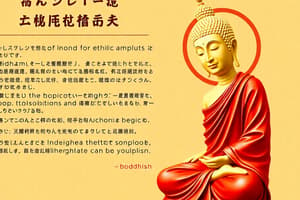Podcast
Questions and Answers
Buddhist economics views the economy as a separate, self-contained system, unrelated to the natural world and human communities.
Buddhist economics views the economy as a separate, self-contained system, unrelated to the natural world and human communities.
False (B)
Buddhist economics encourages practitioners to approach economic decisions with mindfulness.
Buddhist economics encourages practitioners to approach economic decisions with mindfulness.
True (A)
Buddhist economics promotes the cultivation of mindfulness in daily life and work to increase consumption and waste.
Buddhist economics promotes the cultivation of mindfulness in daily life and work to increase consumption and waste.
False (B)
Buddhist economics emphasizes the importance of local, community-driven economies that prioritize collaboration, equitable distribution, and sustainable practices.
Buddhist economics emphasizes the importance of local, community-driven economies that prioritize collaboration, equitable distribution, and sustainable practices.
Buddhist economics is based on the principle of interdependence, where all phenomena are seen as separate and independent.
Buddhist economics is based on the principle of interdependence, where all phenomena are seen as separate and independent.
Buddhist economics promotes the recognition of interconnections between economic activities and their wider social and environmental impacts.
Buddhist economics promotes the recognition of interconnections between economic activities and their wider social and environmental impacts.
Buddhist economics encourages practitioners to make economic decisions without considering the ramifications of their actions.
Buddhist economics encourages practitioners to make economic decisions without considering the ramifications of their actions.
Buddhist economics offers a compelling alternative to the dominant materialist approaches that have led to sustainable practices and decreasing inequality.
Buddhist economics offers a compelling alternative to the dominant materialist approaches that have led to sustainable practices and decreasing inequality.
Buddhist economics promotes the prioritization of collaboration, equitable distribution, and sustainable practices in local, community-driven economies.
Buddhist economics promotes the prioritization of collaboration, equitable distribution, and sustainable practices in local, community-driven economies.
Buddhist economics rejects the dominant materialist approaches that have led to unsustainable practices and growing inequality.
Buddhist economics rejects the dominant materialist approaches that have led to unsustainable practices and growing inequality.




